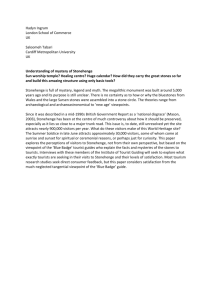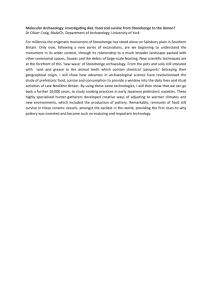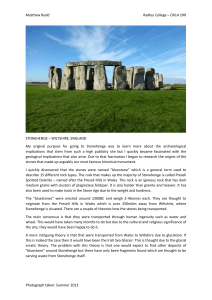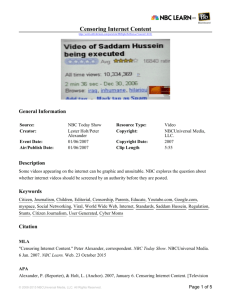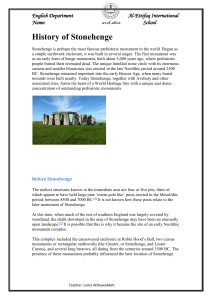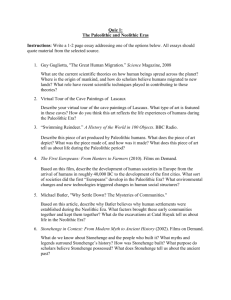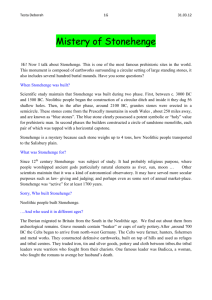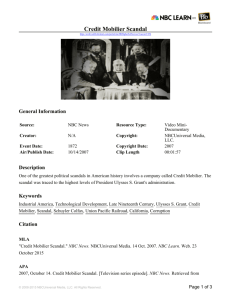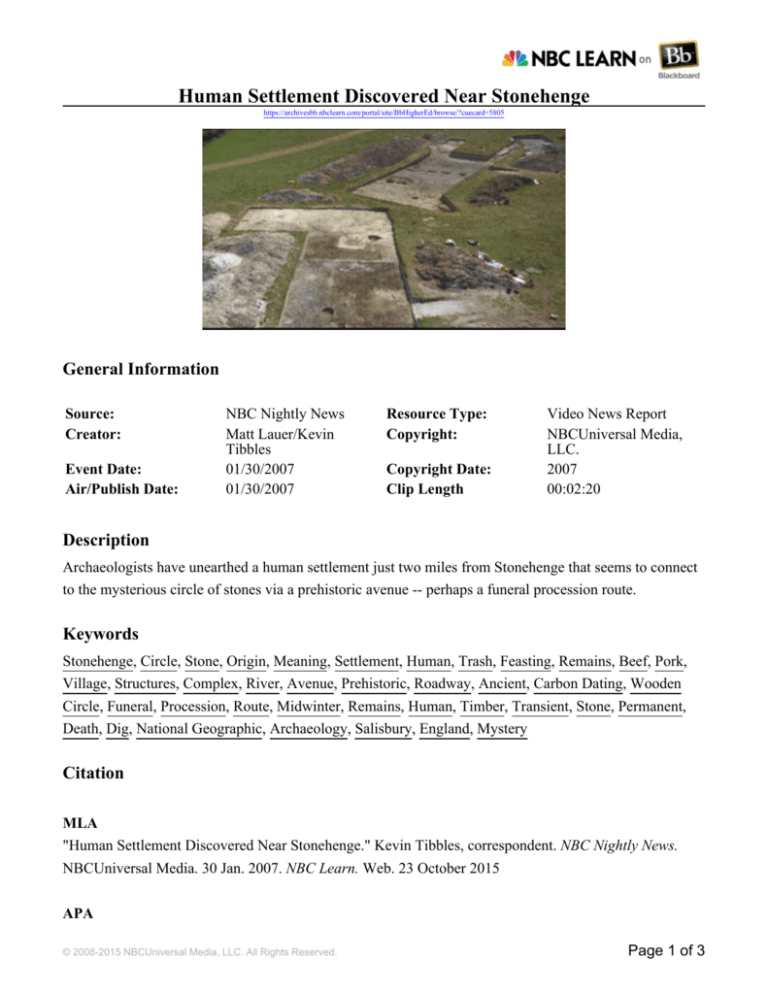
Human Settlement Discovered Near Stonehenge
https://archivesbb.nbclearn.com/portal/site/BbHigherEd/browse/?cuecard=5805
General Information
Source:
Creator:
Event Date:
Air/Publish Date:
NBC Nightly News
Matt Lauer/Kevin
Tibbles
01/30/2007
01/30/2007
Resource Type:
Copyright:
Copyright Date:
Clip Length
Video News Report
NBCUniversal Media,
LLC.
2007
00:02:20
Description
Archaeologists have unearthed a human settlement just two miles from Stonehenge that seems to connect
to the mysterious circle of stones via a prehistoric avenue -- perhaps a funeral procession route.
Keywords
Stonehenge, Circle, Stone, Origin, Meaning, Settlement, Human, Trash, Feasting, Remains, Beef, Pork,
Village, Structures, Complex, River, Avenue, Prehistoric, Roadway, Ancient, Carbon Dating, Wooden
Circle, Funeral, Procession, Route, Midwinter, Remains, Human, Timber, Transient, Stone, Permanent,
Death, Dig, National Geographic, Archaeology, Salisbury, England, Mystery
Citation
MLA
"Human Settlement Discovered Near Stonehenge." Kevin Tibbles, correspondent. NBC Nightly News.
NBCUniversal Media. 30 Jan. 2007. NBC Learn. Web. 23 October 2015
APA
© 2008-2015 NBCUniversal Media, LLC. All Rights Reserved.
Page 1 of 3
Tibbles, K. (Reporter), & Lauer, M. (Anchor). 2007, January 30. Human Settlement Discovered Near
Stonehenge. [Television series episode]. NBC Nightly News. Retrieved from
https://archivesbb.nbclearn.com/portal/site/BbHigherEd/browse/?cuecard=5805
CHICAGO MANUAL OF STYLE
"Human Settlement Discovered Near Stonehenge" NBC Nightly News, New York, NY: NBC Universal,
01/30/2007. Accessed Fri Oct 23 2015 from NBC Learn:
https://archivesbb.nbclearn.com/portal/site/BbHigherEd/browse/?cuecard=5805
Transcript
Human Settlement Discovered Near Stonehenge
BRIAN WILLIAMS, anchor:
It is a standard stop for families touring England, huge blocks of stone erected in a circle. Just don't ask
what it means. Stonehenge has stood there for about 4600 years. While we don't know why, really, we
know more about those who might have built it, thanks to what researchers are calling a newly discovered
treasure not far away. Our report tonight from NBC's Lester Holt.
LESTER HOLT reporting:
For centuries, Stonehenge has drawn everyone from scientists to mystics, all trying to glean the origins
and meaning of this nearly 5,000-year-old circle of stones.
Mr. DAVE BATCHELOR (Archaeologist, English Heritage): Something special must have been about
this place that we can't--we can't get to it.
HOLT: But now scientists may be closer. Just two miles from Stonehenge, a National Geographic team
has unearthed the remains of a human settlement from about 2600 BC, and what its inhabitants left behind
may explain a lot.
Mr. MIKE PARKER-PEARSON: We've got enormous quantities of trash. They're feasting and eating
huge amounts of beef and pork. Some set in that direction...
HOLT: Archaeologist Mike Parker-Pearson led the dig.
Mr. PARKER-PEARSON: It's a very substantial village. It's the same space as this lot going up. So we
think there's a very good case for this being the homes of the builders of Stonehenge.
HOLT: Dr. Parker-Pearson believes Stonehenge is part of a much larger complex of structures linked by a
nearby river and a prehistoric avenue, perhaps the oldest roadway in Europe.
Carbon-dating puts the construction of Stonehenge in south central England at the same time as
development in nearby Durrington Walls, where the village was found and where a wooden circle once
stood. The team has also traced the avenues running to and from a river that formed what now appears to
be a funeral procession route leading to Stonehenge.
Mr. PARKER-PEARSON: I think what we're looking at is a procession that would have taken place quite
probably at midwinter.
HOLT: Human remains have previously been found at Stonehenge itself, but no signs of anyone living
© 2008-2015 NBCUniversal Media, LLC. All Rights Reserved.
Page 2 of 3
there.
Mr. PARKER-PEARSON: The emphasis on timber for one, stone for the other, we think has to do with
notions of transience in life, permanence in death.
HOLT: And providing another clue to unlock the enduring mystery of Stonehenge. Lester Holt, NBC
News, near Salisbury, England.
Related Cue Cards
Russia Promises Heavy Security for 2014 Olympic Winter
Games
https://archivesbb.nbclearn.com/portal/site/BbHigherEd/browse/?cuecard=68518
After several warnings about the potential for a terrorist attack
during the 2014 Olympic Winter Games, Russia promises a
heavily defended fortress at the venues in and around Sochi.
Crisis in Ukraine Could Split Country in Two
https://archivesbb.nbclearn.com/portal/site/BbHigherEd/browse/?cuecard=69943
Russian President Vladimir Putin raises the specter of what he
calls "New Russia," an area that would give Moscow key real
estate and leave Ukraine divided.
Russia Tightens Its Hold on Crimea
https://archivesbb.nbclearn.com/portal/site/BbHigherEd/browse/?cuecard=68997
As Russian forces expand their control in Crimea, many in
Ukraine are wondering how far the troops will go. NBC News
analyst and former ambassador to Russia Michael McFaul
discusses the potential for diplomatic solutions.
Tran-Siberian Railway: Take a Ride on the Most Scenic Trip
in Russia
https://archivesbb.nbclearn.com/portal/site/BbHigherEd/browse/?cuecard=68713
Built between 1891 and 1916 to connect Moscow with the
Far-East city of Vladivostok, the Trans-Siberian Railway in
Russia is the longest railway in the world. If you have enough
money and time, it will take you across two continents, seven
time zones and nearly a third of the planet.
© 2008-2015 NBCUniversal Media, LLC. All Rights Reserved.
Page 3 of 3

